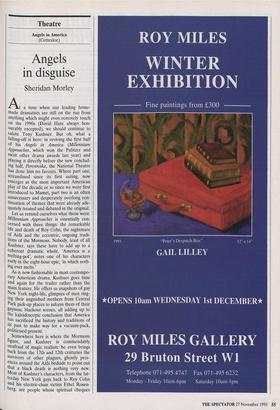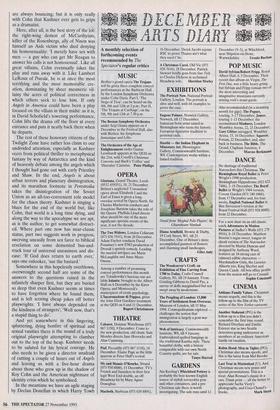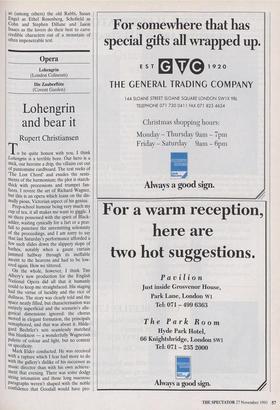Theatre
Angels in America (Cottesloe)
Angels in disguise
Sheridan Morley
At a time when our leading home- made dramatists are still on the run from anything which might even remotely touch on the 1990s (David Hare always hon- ourably excepted), we should continue to salute Tony Kushner. But oh, what a falling-off is here: in reviving the first half of his Angels in America (Millennium Approaches, which won the Pulitzer and most other drama awards last year) and playing it directly before the new conclud- ing half, Perestroika, the National Theatre has done him no favours. Where part one, streamlined since its first outing, now emerges as the most important American play of the decade or so since we were first Introduced to Mamet, part two is an often unnecessary and desperately overlong con- tinuation of themes that were already ade- quately treated and debated in the original.
Let us remind ourselves what those were. Millennium Approaches is essentially con- cerned with three things: the remarkable life and death of Roy Cohn, the nightmare of Aids and the eccentric, ongoing tradi- tions of the Mormons. Nobody, least of all Kushner, says these have to add up to a coherent dramatic whole. 'America is a melting-pot', notes one of his characters early in the eight-hour epic, 'in which noth- ing ever melts.'
As is now fashionable in most contempo- rary American drama, Kushner goes time and again for the trailer rather than the main feature. He offers us snapshots of gay New York night-life, glimpses of men ring- log their anguished mothers from Central Park pick-up places to inform them of their gayness, blackout scenes, all adding up to the kaleidoscopic conclusion that America has sacrificed the history and traditions of its past to make way for a vacuum-pack, politicised present.
Somewhere here is where the Mormons figure, and Kushner is commendably unafraid of magic realism: he even brings back from the 17th and 12th centuries the survivors of other plagues, ghostly pres- ences around the Aids bedside to point out that a black death is nothing very new. Most of Kushner's characters, from the lat- terday New York gays back to Roy Cohn and his electric-chair victim Ethel Rosen- berg, are people whose spiritual cheques are always bouncing; but it is only really with Cohn that Kushner ever gets to grips as a dramatist.
Here, after all, is the best story of the lot: the right-wing demon of McCarthyism, killer of the Rosenbergs, ally of Nixon was himself an Aids victim who died denying his homosexuality: 'I merely have sex with men — a guy who can get Mr Reagan to answer his calls is not homosexual'. Like all great villains, Cohn eventually takes the play and runs away with it. Like Lambert LeRoux of Pravda, he is at once the most terrifying and the most memorable cre- ation, dominating by sheer mesmeric vil- lainy the acres of political correctness in which others seek to lose him. If only Angels in America could have been a play focused on the villain in their midst: as it is, in David Schofield's towering performance, Cohn lifts the drama off the floor at every entrance and puts it neatly back there when he departs.
The rest of these honorary citizens of the Twilight Zone have rather less claim to our undivided attention, especially as Kushner veers from political thriller to metaphysical fantasy by way of Antarctica and the kind of heavenly debate among the angels which I thought had gone out with early Priestley and Shaw. In the end, Angels is about urban terrors and planetary disintegration, and its marathon footnote in Perestroika takes the disintegration of the Soviet Union as an all-too-convenient role model for the chaos theory. Kushner is singing a blues for the end of the world but, like Cohn, that world is a long time dying, and along the way to the apocalypse we are apt, as is the author, to get somewhat distract- ed. Where part one now has near-classic status, part two suggests work in progress, swerving uneasily from sex farce to biblical revelation on some demented bus-and- truck tour of universal uneasiness and dis- ease: 'If God does return to earth ever,' says one onlooker, 'sue the bastard.'
Somewhere in this hopelessly overblown, overwrought second half are some of the answers to the questions raised in the infinitely sharper first, but they are buried so deep that even Kushner seems at times to have forgotten where he found them, and is left scoring cheap jokes off better playwrights: 'I have always depended on the kindness of strangers'; 'Well now, that's a stupid thing to do'.
And yet somewhere in this lingering, spluttering, dying bonfire of spiritual and sexual vanities there is the sound of a truly original playwright attempting to clamber out to the top of the heap. Kushner needs to be saluted for his lyrical courage. He also needs to be given a director unafraid of cutting a couple of hours out of Angels and leaving us with a five-hour drama about those who grew up in the shadow of Roy Cohn and the American nightmare of identity crisis which he symbolised.
In the meantime we have an agile staging by Declan Donellan in which Harry Towb as (among others) the old Rabbi, Susan Engel as Ethel Rosenberg, Schofield as Cohn and Stephen Dillane and Jason Isaacs as the lovers do their best to carve credible characters out of a mountain of often impenetrable text.












































































 Previous page
Previous page